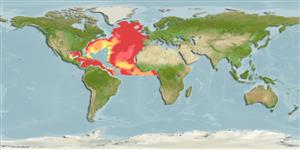Teleostei (teleosts) >
Gadiformes (Cods) >
Macrouridae (Grenadiers or rattails)
Etymology: Nezumia: A Japanese word that means "mouse".
Environment: milieu / climate zone / depth range / distribution range
Ecology
Marine; bathypelagic; depth range 1440 - 1710 m (Ref. 6187). Deep-water
Atlantic Ocean: Madeira and Gulf of Mexico.
Size / Weight / Age
Maturity: Lm ? range ? - ? cm
Max length : 40.5 cm TL male/unsexed; (Ref. 6187)
Blunt nosed. Broad bands of small teeth in both jaws. Body medium brown with bluish tinge on lateral walls of the abdomen and blackish ventrally. Lips, branchiostegal membranes and fins blackish (Ref. 37108).
Life cycle and mating behavior
Maturity | Reproduction | Spawning | Eggs | Fecundity | Larvae
Geistdoerfer, P., 1986. Macrouridae. p. 644-676. In P.J.P. Whitehead, M.-L. Bauchot, J.-C. Hureau, J. Nielsen and E. Tortonese (eds.) Fishes of the north-eastern Atlantic and the Mediterranean. UNESCO, Paris. Vol. 2. (Ref. 6187)
IUCN Red List Status (Ref. 130435: Version 2024-1)
Threat to humans
Harmless
Human uses
Fisheries: of no interest
Tools
Special reports
Download XML
Internet sources
Estimates based on models
Preferred temperature (Ref.
123201): 3.6 - 6, mean 4.2 °C (based on 83 cells).
Phylogenetic diversity index (Ref.
82804): PD
50 = 0.5000 [Uniqueness, from 0.5 = low to 2.0 = high].
Bayesian length-weight: a=0.00214 (0.00109 - 0.00421), b=3.20 (3.03 - 3.37), in cm total length, based on LWR estimates for this (Sub)family-body shape (Ref.
93245).
Trophic level (Ref.
69278): 3.3 ±0.1 se; based on size and trophs of closest relatives
Resilience (Ref.
120179): Low, minimum population doubling time 4.5 - 14 years (Preliminary K or Fecundity.).
Fishing Vulnerability (Ref.
59153): Low to moderate vulnerability (31 of 100).
